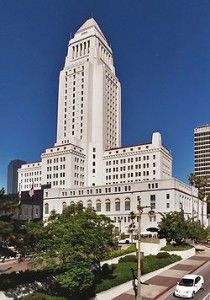Brown Hates Open Meetings?
by Anthony Pignataro | March 9, 2011 10:33 am
 [1]MARCH 9, 2011
[1]MARCH 9, 2011
Where Governor Jerry Brown is concerned, anything goes. It’s a mistake to call him a mere liberal — while I have no doubt that he adheres to some vague progressive impulses, he is fully capable of proposing policies that defy ideology.
A recent example of this is his proposal to cut part of the budget by “suspending” some Open Meeting Act Reform mandates for one year. These mandates allow cities and local governments to seek reimbursement from the state for carrying out various provisions of the Open Meeting Act like preparing meeting agendas, posting the agendas in “accessible locations” 72 hours before meetings, disclosing items to be discussed in closed sessions and training legislative officials in carrying out closed sessions as provided by the Open Meeting law.
The Open Meeting law, which dates to 1953, is one of the pillars of modern democracy in California. It forces elected bodies to meet in public and act only on business that has been placed on agendas well in advance of meetings, so members of the public have time to prepare and, if necessary, comment. In 2004, voters also passed Proposition 59, which also mandates public access to local government meetings, though the Legislature has never passed a law actually implementing the measure.
Now according to the state Legislative Analyst’s Office (LAO), suspending the reimbursements for things like posting agendas will save — drum roll, please — about $63 million in 2011-12. Now while such savings are a pittance when compared to the state’s $20 billion budget deficit, there’s considerable evidence that localities have been over-billing the state, sometimes lavishly so.
“Some entities billed the state as much as $75 a hour to compile the agendas,” the Associated Press reported in this Feb. 26 story[2] on recent audits of the Open Meeting Act mandate reimbursements. “The [state] controller’s office decided that several of the claims far exceeded what it deemed reasonable.” In the case of Contra Costa County, for instance, the AP discovered that the controller’s office had rejected $795,000 of $1.1 million in claims from July 2002 to June 2004. It also rejected $1.8 million of $1.9 million in claims from July 1999 to June 2001.
That being said, Brown’s proposal is a rotten, risky idea that would do far more harm than good.
“The governor’s plan to suspend the mandates for one year is a bad idea because it will create year-to-year uncertainty as to what is required of local agencies,” said Lawrence McQuillan, a scholar and colleague of mine at Pacific Research Institute who is currently finishing work on a study of California’s open records and meetings laws. “Californians deserve certainty and transparency.”
The LAO agrees with McQuillan, calling the governor’s proposal in a Feb. 24 report “confusing to the public” and says it sends the “wrong signals to local government.”
“Using the one-year budget act suspension process to change statutory requirements regarding public access to local government decision making reduces transparency in government,” reported the LAO. “Suspending the provisions regarding agenda posting and closed session disclosure could be interpreted as the Legislature making these provisions optional.”
But the LAO’s remedy is even worse. The Legislative Analyst recommends that each local government simply be left to “announce its policies” for carrying out the law. This, the LAO finds, would also save $63 million a year while steering clear of the “year-to-year uncertainty” that comes with Brown’s idea. To McQuillan, this is asking for trouble.
“The LAO’s recommendation to recast the mandates as ‘best practices’ and have local governments develop their own implementing ordinances that will ultimately fulfill Proposition 59 is unproven, speculative and fraught with problems,” McQuillan said. “This approach will be a litigator’s dream because each local implementing rule could be subject to court challenge as to whether it moves toward fulfilling Prop 59 or moves away from it. Also, this process will be very slow, costly in terms of rulemaking and litigation, and result in a lack of uniformity across jurisdictions, at least until the state Supreme Court finally decides each issue.”
Indeed, the LAO seems to recognize as much, finding in its report that under its own recommendation “some local agencies could enact alternative policies.” Though Prop 59 prevents these new policies from limiting public access to meetings, “even modest procedural changes in public access policies, however, could cause some short-term confusion, making it more difficult for Californians to oversee actions of their local agencies.”
So what’s the solution? How about leaving things exactly as they are. That means continuing to spend $63 million a year reimbursing local governments for things like posting agendas. When you’re dealing with a deficit in excess of $25 billion, such a tiny sum is all but irrelevant.
Of course, our state officials, and Jerry Brown in particular, are utterly incapable of leaving anything alone, so don’t expect so revolutionary an idea to gain any traction.
-Anthony Pignataro
- [Image]: http://www.calwatchdog.com/wp-content/uploads/2011/03/Los_Angeles_City_Hall_color_edit1-wikipedia.jpg
- this Feb. 26 story: http://www.thereporter.com/news/ci_17489210
Source URL: https://calwatchdog.com/2011/03/09/brown-hates-open-meetings/